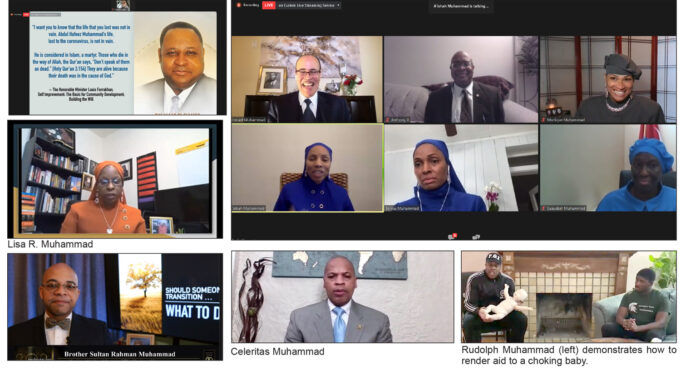The purpose of the Disaster Preparedness Workshop during Saviours’ Day 2021 was demonstrated in a short video just before the workshop began.
“There is no place on this earth that has received as much calamity from weather as much as the United States of America,” the Honorable Minister Farrakhan declared in the video, as images of floods, snow, fires and scenes of natural disasters flashed across the screen. His (God’s) intention is the total destruction of America, the Minister warned.
The question is, are you prepared?
To that end, morning and afternoon virtual workshops on the topic Feb. 26 were held to inform and instruct attendees. Workshop coordinator A’ishah Muhammad announced areas to be discussed in the morning session including Situational Awareness; Cyber Security; How to respond in a Medical Emergency; Securing the home; among other areas.
She showed video scenarios with helpful guidance of emergency situations such as the breakdown of your car on a countryside road in cold weather and intruders breaking into your home.
“Most people don’t know they are not prepared until disaster strikes,” said Sister Lisa R. Muhammad, presenter on Situational Awareness. “Who knows the emergency action plan for your school, your home or work?” she asked.
Among 10 tips on Situational Awareness are knowing your General Orders, being mindful of people around you, identifying entry and exit points of buildings and staying vigilant in public (not wearing earplugs that block out sounds).
Amin Muhammad, a systems engineer and business analyst in Chicago, discussed cyber security and how to keep people from hacking your digital devices and stealing your information.
Computer security is information technology security, he said. Your digital device is a portal to the outside world, but it also can let others in, he added.
Those portals include email, apps, websites, cell phones and other “doors” we use every day, he said.
“Think before you click,” Amin Muhammad warned.
“Don’t click on links or attachments from unsolicited sources.”
Several tips he offered: Don’t use the same password for multiple accounts; avoid using public Wi-Fi spots; enable 2-factor authentication; never click “I agree” on an internet pop up ad.
Presenter Rudolph Muhammad of the Ministry of Health demonstrated how to save a choking victim, how to apply CPR and how to operate an Automatic External Defibrillator (AED) on a heart attack victim.
A demonstration on securing your home doors and windows was given by Clifton Muhammad and martial artist Celeritus Muhammad explained the “8 Musts” of security. The “Musts” include role playing emergency scenarios with family, building alliances with your neighbors, investing in a security system, and learning how to use household items as weapons.
Tequella Muhammad presented on the topic “A Time Well Spent,” focusing on optimizing time within the home to develop self, engage children through “virtual fatigue” and engaging in productive physical activities with the family.
The afternoon workshop focused on mental and spiritual health in the era of Covid-19, ending with a panel discussion featuring physicians and social work experts.
Every member of the family must prepare a “Go Bag” for use during an emergency where the family must leave the house, explained Christina Muhammad of Dallas. The bag must be sturdy, easy to carry and contain extra car and house keys, photos of your family for identification purposes, a flashlight, non-perishable food items, water and other survival items.
“We want to stay ready to keep from getting ready,” she said.
Student National Imam Sultan Rahman Muhammad discussed practices and procedures for the dead during times of disaster and mass deaths, beginning with when a Muslim is at the point of death, just after death, mourning for the dead and Janazaa (funeral service).
“In situations of mass deaths, we are not to put ourselves in harm’s way,” he said, relating to handling victims of Covid-19 and other pandemics. “We celebrate the life of our loved ones” and not fall into despair, he said.
Panelists addressed mental health issues from the perspective of their professions. Student Minister Ishmael Muhammad laid the basis for the discussion, explaining that anxiety and stress stems from resisting what God wants us to do versus our own desires.
If a Believer is struggling with anxiety and grief, it could be because that person is looking for an alternative way than God’s way, he said.
“Despair produces anxiety in the person. Why are you losing your mind in faith? From the word of God, the Believer is given hope … and made secure,” he said.
Clinical health professional Anthony X put it bluntly: “People are so at their wits end and they’re looking for everything and anything as a remedy to their stress. There’s a saying that if you want to feel better, take a pill. If you want to change, face the truth.”
Social worker Saaudiah Muhammad explained that many people already were “dangling by a thread” but the pandemic was their breaking point. Now many of her clients are using marijuana to cope, she said.
Other panelists were trauma specialist Monique Muhammad and private practitioner Teresa Muhammad of Los Angeles.
Workshop attendees expressed gratitude to presenters.
“This couldn’t have come at a better time! It’s a clearer idea of how to help ourselves and one another!” Nicole 4X wrote in the chat box.
“This has been amazing,” added DiLauris Muhammad.













